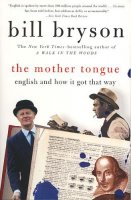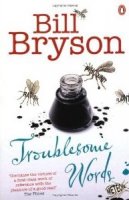

The Mother Tongue: English and How It Got that Way (first published 1991, reissued by Perennial 2001) and Troublesome Words (first published 1984, revised 1997, reissued by Penguin Books 2009), both by Bill Bryson
My father and my sister-in-law became hooked on Bill Bryson as a writer; perhaps it is now my turn.
For the first twelve chapters, The Mother Tongue is an accessible, page-turning look at the English language: where it came from, why it’s so popular, and how it came to be simultaneously one of the easiest and one of the hardest languages to learn.
Unfortunately, the book peters out a bit after that, with a few less interesting, apparently random diversions. The chapter on swearing, for example, was dreary. As a child I would have devoured it, such words being the kind with some magical power that required one to step over the square on the sidewalk where one occasionally saw them scrawled. Graffiti was my only contact with profanity then: no one I knew used such language, and it was certainly not in any books, movies, or TV shows of my experience—not even the dictionary (trust me, we looked). But that was then, and this is decidedly now. There is no longer anything rare, titillating, or even informative about bad language—at best it is irritating, and keeps me from giving The Mother Tongue the wholehearted recommendation it otherwise deserves. With that caveat, however, this is still a delightful and worthwhile book.
One of the undoubted virtues of English is that it is a fluid and democratic language in which meanings shift and change in response to the pressures of common usage rather than the dictates of committees. It is a natural process that has been going on for centuries. To interfere with that process is arguably both arrogant and futile, since clearly the weight of usage will put new meanings into currency no matter how many authorities hurl themselves into the path of change.
But at the same time, it seems to me, there is a case for resisting change—at least slapdash change. Even the most liberal descriptivist would accept that there must be some conventions of usage. We must agree to spell cat c-a-t and not e-l-e-p-h-a-n-t, and we must agree that by that word we mean a small furry quadruped that goes meow and sits comfortably on one’s lap and not a large lumbering beast that grows tusks and is exceedingly difficult to housebreak. In precisely the same way, clarity is generally better served if we agree to observe a distinction between imply and infer, forego and forgo, fortuitous and fortunate, uninterested and disinterested, and many others. As John Ciardi observed, resistance may in the end prove futile, but at least it tests the changes and makes them prove their worth.
We in the English-speaking world have often been highly complacent in expecting others to learn English without our making anything like the same effort in return. As of 1986, the number of American students studying Russian was 25,000. The number of Russian students studying English was four million…. In 1986, the Munich newspaper Süddeutsche Zeitung investigated the studying of German as a foreign language around the world. In the United States, the number of college students taking a German course was 120,000, down from 216,000 in 1966. In the Soviet Union, the number was nine million. The problem is unlikely to get better. Between 1966 and 1986, 150 American colleges and universities canceled their German programs. In 1989, some 77 percent of all new college graduates had taken no foreign language courses.
A presidential commission under Ronald Reagan called the situation scandalous. In 1987, in an effort to redress the balance Congress voted into law the Education for Economic Security Act, which provided an extra $2.45 million to promote the study of foreign languages—or a little over one cent per person in the country. That should really turn the tables.
Granted, these figures are old—but somehow I doubt there’s been significant improvement since. Personally, I think we need an Education for National Security Act, which would forbid going to war against people who speak a language for which we do not have a strong base of fluent translators.
Not only are we not doing terribly well at foreign languages, we’re not even doing terribly well at English. The problem was well voiced by Professor Randolph Quirk, president of the British Academy and one of that country’s leading linguistic scholars, when he wrote: “It would be ironic indeed if the millions of children in Germany, Japan and China who are diligently learning the language of Shakespeare and Eliot took more care in their use of English and showed more pride in their achievement than those for whom it is the native tongue.”
We might sometimes wonder if we are the most responsible custodians of our own tongue, especially when we reflect that the Oxford University Press sells as many copies of the Oxford English Dictionary in Japan as it does in America, and a third more than in Britain.
For those who care to be better custodians of our language, I can recommend Bryson’s Troublesome Words. Although written in dictionary format, I found it enjoyable to read cover to cover. Do you want to know when to use “fewer,” and when to use “less”? Or how to spell the name of that pleasant airport in Amsterdam? Or the crucial difference between “sensual” and “sensuous”? Troublesome Words will let you know, and entertain you at the same time.
(Thanks, Janet and Stephan!)
You're welcome! We're glad you liked them.
I once heard that Swiss authors who write in German are generally stricter in their grammar than their German counterparts. I don't know if that's substantiated, but the explanation given was that they learn written German as a semi-foreign language and therefore have a more grammatical and less vernacular approach to it. Perhaps it's the same when comparing (talented) students of English with their native speaking counterparts.
I thought it would be interesting to see how the offerings for language have changed.
When I went to high school (I graduated in 1981), I had a choice of taking Spanish, French, German, Russian, and Latin. This year they offer all but Russian (The Cold War is over).
A couple of years ago, my old town decided to build their own high school and leave the city school that I went to. The new school offers ASL, French, Latin, Chinese, and Spanish. German is only offered to those students that started it and wish to finish it.
In contrast, the town I live in now only offers French, Spanish, and Chinese. In fairness, it is smaller than the other two schools, but I was surprised Latin wasn't offered.
S
I'm procrastinating what I should be doing, clearly. :) Here's what I found from (1) Heather and Janet's former high school (Florida), and (2) mine (Pennsylvania):
(1) French, German, Latin, and Spanish, all through the Advanced Placement level.
(2) French, German, Latin, and Spanish through the AP level, and two years of Italian.
My data above is current, by the way; I'm fuzzy on the past. Maybe Heather and/or Janet will remember what was offered in their day; I think it was similar to now. The school also has a dual enrollment relationship with local colleges (Janet took advantage of that), so anyone who wants to study a language that is not offered (and is willing to drive) has that option.
In my day I remember French, German, Latin, and Spanish; beyond that I don't know, except that our exchange student to Japan took her language classes at the University of Pennsylvania.
I don't know how this will fit into your "Hillsboro is 20 years behind the rest oof the world", but when I was there you could take four years of French and two years of Spanish (the Spanish wasn't certified to teach more than that, though she did do some private tutoring to expand on the two years).
I don't know the number of years available, but the last time I got a data point (probably a year or two ago) there were at least six languages available at the high school level, and a couple of them optionally start earlier.
Oops. I should have read "Troublesome Words" before we gave it to you then . . .


